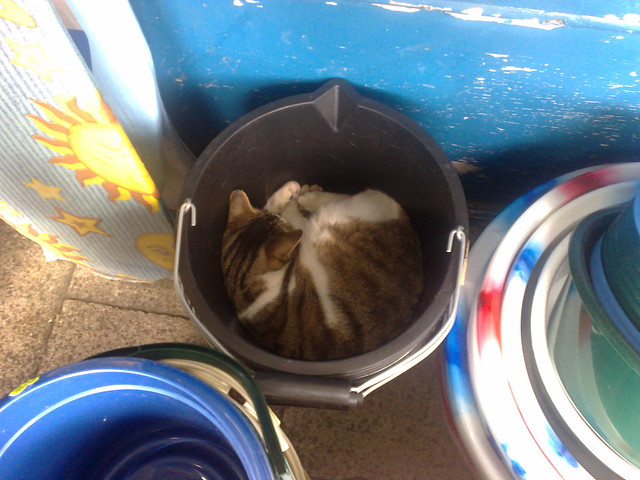Alternatively, "People give their hard-earned cash away and you won't believe it", or "5 charities you should donate to before you die".
I was looking for another book to read just when the ALS ice bucket challenge videos started showing up everywhere. Some of the videos were amusing, and who didn't want to see billionaires and celebrities get soaking wet? I didn't know what ALS was and had no idea why people would rather dump ice cold water on themselves instead of giving $100 (the people who were doing the challenge initially certainly wouldn't even blink for that amount). Some quick thoughts about the California drought and popularity contest came to mind, but it wasn't something worth killing my brain cells over.
The videos were fun to watch but I needed more entertainments on MTR rides than 10-second videos. The book I had just finished, The (Honest) Truth About Dishonesty, referenced a few other books: Get Rich Cheating, Nudge, and The Halo Effect. Reading the reviews on those and browsing through related books eventually led me to Poor Economics: A Radical Rethinking of the Way to Fight Global Poverty, the book that got me interested in behavioral economics and one that I've been meaning to re-read.
The premise of Poor Economics is although poor people have very little money, it doesn't mean that they don't make many economics decisions or that their decisions are uninteresting. Quite the contrary, they have to make numerous choices in their daily lives precisely because they have so little to spare. Furthermore, their choices often surprise us, and we cannot help them get out of poverty unless we understand how and why they make those choices.

As I was re-reading the book, popularity of the ice bucket challenge exploded. More and more of my friends were getting themselves wet and the threat that this modern day chain letter would get from Mark Zuckerberg and the like to me was imminent. I decided to do some research so I could make an informed decision in case someone challenged me.
With popularity came criticisms. I didn't have to look far for opinions. "It's a waste of water! California is in a drought!" "ALSA only spends a few percent of their budget on research and who knows how they spend the other 90+%!" "People are just doing this for fun/fame and not for charity."

Cat asleep in a bucket, because every successful internet article needs a cat photo Source: Flickr (CC BY-SA 2.0)
Thankfully, it didn't take long to find out that a bucket of water isn't much compared to how much water we use everyday for other purposes (we use about 20 buckets of water everyday, on average). It also wasn't hard to find a breakdown of ALSA's annual spending, and while they are not terribly efficient, they do largely seem to spend their money on the ALS community. And while not everyone maybe sincere in their efforts, it's undeniable that it helped raise enough money for ALSA for the next 5 years, at current spending level. An amount most other charitable organizations could only dream of.
The ice bucket challenge was clearly a very effective way to get people to open up their wallets (so effective that ALSA tried, and then backtracked, to trademark "ice bucket challenge"). A little too effective, maybe. Regardless of what you think about ALS, (no doubt it's a horrible disease but it only affects about 0.0039% of the population) it's questionable whether any organization can effectively make use of such a large and sudden infusion of money. It would have been better if some of that money were donated to other charities instead. But which ones?
Back to the book. Much of the book is devoted to analyzing the lives of people in extreme poverty: those who survive with less than 1 USD a day, after adjusting for purchasing power. Through various randomized controlled trials, researchers attempted to find concrete and provably effective ways to improve the lives of the poor. Because "[t]alking about the problems of the world without talking about some accessible solutions is the way to paralysis rather than progress." The same paragraph points to Peter Singer's The Life You Can Save. In the promotional video (and his book), Singer points out that the annual budget needed to cut global poverty in half is not much more than the amount Americans spend on alcohol every year.
That reminded me of a short lived personal initiative. For a while I was trying to note down how much I spend on alcohol and donate half of that amount to charity. Bookkeeping while intoxicated was clearly not a trivial problem, so I gave up soon after I started. That said, I still think there's merit in tying charitable givings to spending on guilty pleasures, although I'd need to come up with a better execution strategy first.
On the website, Singer asks visitors to pledge giving at least 1% of their income to help others. The pledge doesn't require you to donate to specific charities, although there is a list if you wanted suggestions.
Near the top of the list is an organization called GiveDirectly. This American Life talked about them last year. Their basic idea is instead of prescribing what we think poor people need to them, just give them money directly (hence the name) and let them figure out what to do with it. Turns out if you give people who live under leaky roofs a lot of money (the amount they give per family is usually a couple times their annual incomes), the vast majority of them use it wisely.
For the record I have not made the pledge. Given that I am not currently working, pledging to give 1% of my $0 income doesn't make a lot of sense. That said, using my past salary as reference, I haven't been too far off, at least not orders of magnitudes off. Of course, I never dumped ice water on my head every time I made a donation. I didn't need to, I thought, because the decision to help others is a very personal thing.
The ice bucket challenge showcased the power of social media to charities around the world. Replicating that success maybe difficult though, eventually we get unsensitized by all the wet celebrities. Amazon is (in?)famous for their one click patent, and Buzzfeed showed us how to give any article an enticing headline. We have learned a lot in studying human behaviors and making tons of money from it. Applying that knowledge to eradicate extreme poverty from the remaining billion of people? That could just be the Next Big Thing.

